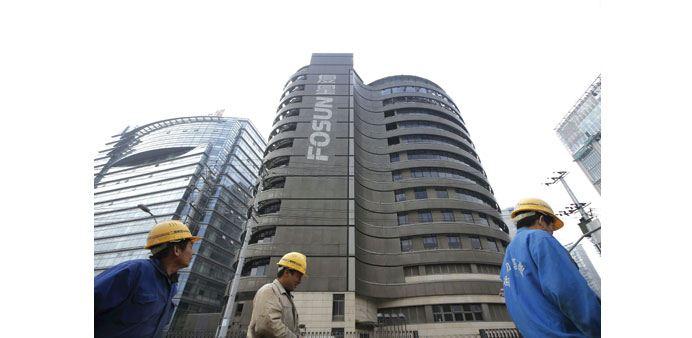Construction workers walk past the headquarters of Fosun International in Shanghai. Fosun’s aggressive international acquisitions strategy may hit a speed bump if Beijing extends a probe into the affairs of its chairman Guo Guangchang, according to bankers and credit analysts.
Reuters
Hong Kong
Chinese conglomerate Fosun Group’s aggressive international acquisitions strategy may hit a speed bump if Beijing extends a probe into the affairs of its billionaire chairman Guo Guangchang, bankers and credit analysts say.
Fosun International, the group’s main investment arm, has mainly used debt to amass about $55bn worth of assets ranging from insurance companies to French resort operator Club Med so far to build a global empire.
This has left the company with a debt-to-equity ratio that stood at 2.1 as of last year, Thomson Reuters data shows, equivalent to 6 times the industry average and underscoring Fosun’s reliance on external funding for its expansion plans.
Analysts, however, say access to these funds could become more difficult if the investigation into Guo deepens, rattling investors already spooked by a widespread government crackdown on corporate graft, especially in China’s financial sector.
“An extended investigation of Guo could potentially have a negative impact on the company’s access to funding and its acquisitions that are pending completion,” ratings agency Standard & Poor’s said yesterday, adding that there was no immediate impact on Fosun International’s ratings.
A Fosun spokeswoman declined to comment.
News of the investigation came as a unit of Fosun is in the process of negotiating a $700mn credit line, which the company needs to finance its day to day operations, bankers say.
In a sign of the difficulties the company could face, one of the bankers familiar with the loan said the creditors had now become more cautious.
“We are conservative (on the loan) right now and need a clarification of why Guo was assisting authorities with the investigation,” said the banker. Fosun made headlines late last week after a respected Chinese magazine reported Guo was missing, raising concerns that the company was being drawn into the government’s crackdown on corruption.
Several senior Chinese executives have temporarily disappeared this year amid the anti-graft campaign. Fosun has since sought to reassure investors, saying Guo was assisting the authorities with an investigation into his personal affairs and that the business was running as usual. Guo also attended a company meeting yesterday.
Investors, however, remained wary, sending Fosun International’s shares down about 9% on Monday. Bankers also said Fosun’s high debt levels could become a concern if access to funding is diminished.
Fosun has raised $2bn so far this year and was a eyeing a $500mn to $800mn bank loan this month which was separate from the $700mn credit line, bankers said.
Moody’s, which rates Fosun just one notch above junk status, estimates Fosun had $2.8bn in unpaid bills for acquisitions at the end of last year while Thomson Reuters data shows it owed $15bn at the end of June, more than its current market value of $13.2bn.
A total of $1.16bn worth of bonds are maturing next year, with $309mn coming up in May, Thomson Reuters data shows.
“Fosun is in a tough spot, but the banks are likely to stick with them due to their strong reputation. The hope is that this crisis will blow over soon,” said one senior Hong Kong-based M&A banker.

